(Spotlight Delaware is a community-powered, collaborative, nonprofit newsroom covering the First State. Learn more at spotlightdelaware.org).
Large-scale solar projects on farmland have been controversial in Delaware for years, and now, funding changes at the federal level may slow the growing industry.


U.S. Agriculture Secretary Brooke Rollins announced last month that her agency will no longer provide guaranteed loans to large-scale solar projects on farmland.
“Subsidized solar farms have made it more difficult for farmers to access farmland by making it more expensive and less available,” Rollins wrote in a press release.
Some Delaware farmers see this change as a win for farmland preservation.
“I am absolutely tickled to death,” said Jim Minner, Kent County Farm Bureau president. “We’re losing too much really good viable farmland to solar.”
The change follows a period of rising wholesale electricity costs across the mid-Atlantic – one that last year sparked a backlash from state governors who called for sweeping reforms, including faster approvals of proposed wind and solar projects.
It also comes as Delaware lawmakers try to push for increases in the amount of renewable power produced in the state. In 2024, about 9% of Delaware’s total in-state net generation came from renewable resources, with most of it produced by solar energy, according to the U.S. Energy Information Administration.
State officials want that figure to reach 40% by 2035.
This is not the first time the Trump administration has ended funding for solar projects.
President Trump’s Reconciliation Budget Bill, also known as the “One Big Beautiful Bill Act,” signed into law this past July, made significant cuts to clean energy incentives.
The law eliminated residential clean energy tax credits, which allowed homeowners to deduct 30% of the systems’ costs from their taxes. The incentive will expire on Dec. 31.
In addition, companies and developers seeking to qualify for commercial clean energy tax credits must either start their projects before July 6, 2026, or have their projects in service by the end of 2027.
Dale Davis, president of CMI Solar and member of the Delaware Solar Energy Coalition, said the cuts to federal funding, the tax credits and high tariffs on importing solar panels will “definitely create a downward trend” in new solar projects across the country.
Farmers react
Minner said that local farmers are glad to see the USDA end the guaranteed loans to solar because of the rapid development of farmland in the southern part of the state.
“What we don’t lose to houses, we lose to solar panels,” he said.
Minner, who has been a crop farmer in Kent County for 35 years, recently lost a piece of farmland in the town of Viola that he had rented after the owners chose to lease it for community solar panels instead.
“That was the best piece of ground I had,” Minner said. “It’s in solar panels now. I didn’t own that. So, I had to take whatever was given.”
Minner argues the spread of solar panel projects onto productive farmland means less land available for agriculture, forcing small farmers like him to compete for what’s left while also facing higher costs, as the financial incentives for leasing land to solar companies are often far better than farming income.
“As more farmland goes into solar, all of us farmers are going to be fighting, competing for the same land, just – it’s not good,” he said.
This opposition to solar projects on farmland isn’t new.
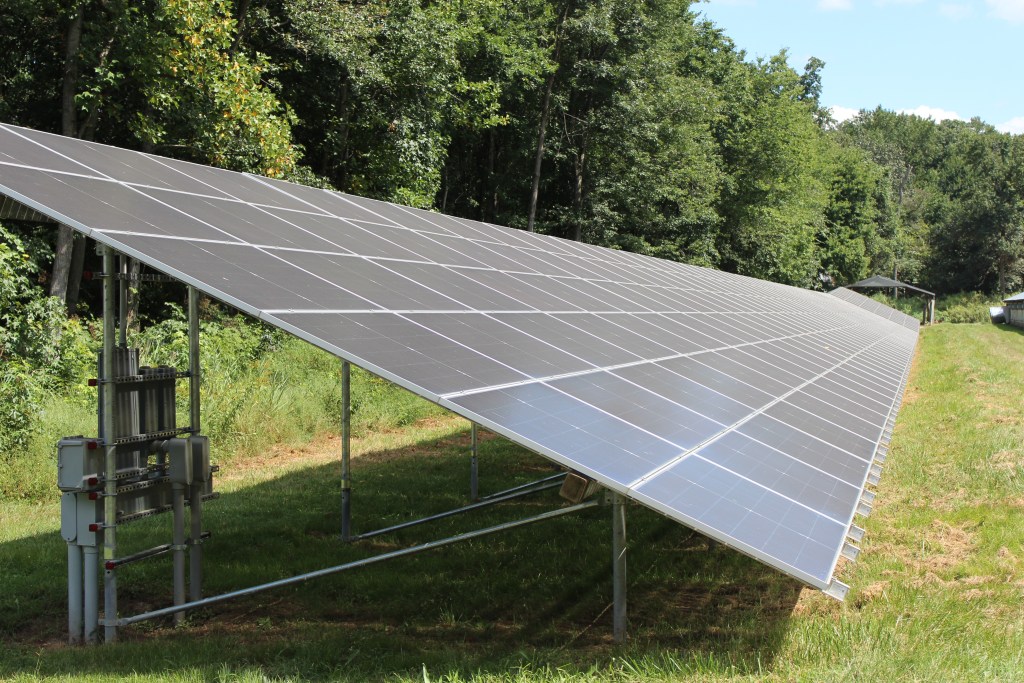 Solar panels installed in 2021 using state and federal grant funding help Greg Ains power his New Castle County poultry farm. | SPOTLIGHT DELAWARE PHOTO BY OLIVIA MARBLE
Solar panels installed in 2021 using state and federal grant funding help Greg Ains power his New Castle County poultry farm. | SPOTLIGHT DELAWARE PHOTO BY OLIVIA MARBLEIn 2023, Kent County approved new restrictions that banned massive solar projects on farmland in response to the growing number of solar projects in the county.
Individual solar projects now have a 50-acre limit in the county’s agriculture conservation zoning district, and there is a cap of 800 total acres that can be taken up by solar projects in that district.
“I’m not opposed to solar, but I’m opposed to solar taking up valuable farmland,” said Tricia Nash, a Kent County farmer who advocated for the solar limits.
But Davis, the president of CMI Solar, said community solar projects on farms can actually help preserve farmland.
Farmers can make more money by leasing out parts of their land for solar projects than they could from farming it, helping financially support the rest of the farm, Davis said.
And once the lease on a solar project ends — usually after about 25 years — the land could go back to agricultural use, whereas the landscape would be permanently changed with other types of development.
“Once you build a house on it, it is never reverting back to agriculture, ever,” Davis said.
But Kent County farmer Paul Cartanza Sr. said it is “very, very expensive” to restore farmland to its original state after it has been used as a solar field.
Solar companies sometimes agree to front the cost of removing all their equipment after the lease is up, but the topography and health of the soil still needs to be restored, Cartanza said.
Some solar on farms still funded
Delaware farmers will still be able to get guaranteed loans for some solar projects, however.
The USDA Rural Development Rural Energy for America Program will give loans for solar projects that generate less than 50 kilowatts of power as long as they are “right sized” to only provide power to the farm itself.
New Castle County poultry farmer Greg Ains has one of these small-scale solar projects that produces about 21 kilowatts, about 90% of the power he needs to run his farm.
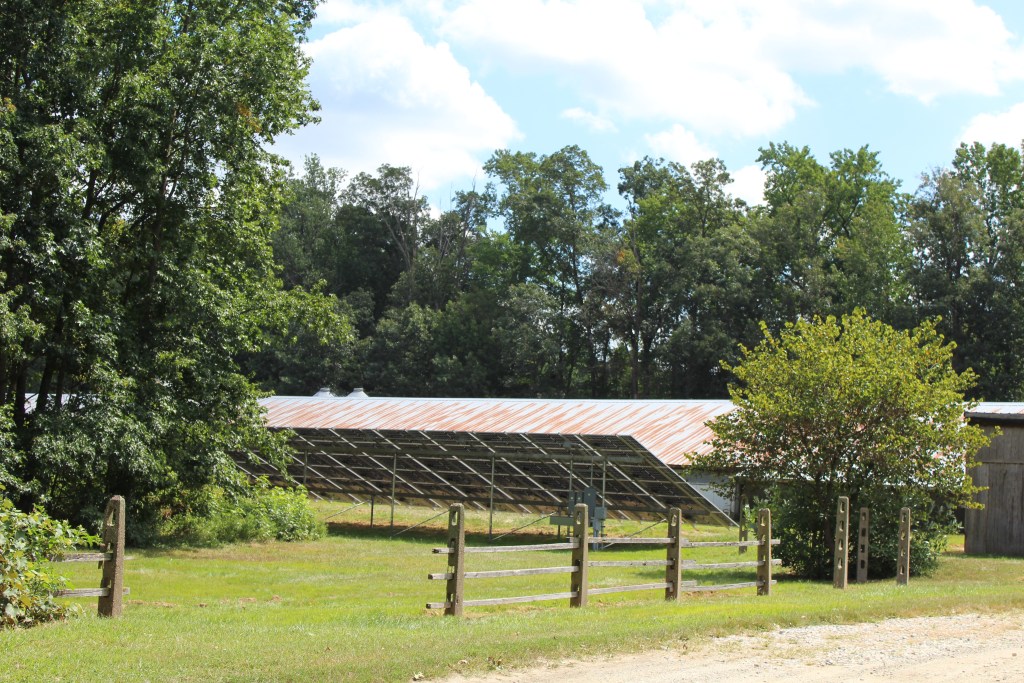 Greg Ains, a New Castle County poultry farmer, installed solar panels on his property in 2021 using state and federal grant funding. Similar funding opportunities that incentivize renewable energy projects on farmland being slashed by the federal government. | SPOTLIGHT DELAWARE PHOTO BY OLIVIA MARBLE
Greg Ains, a New Castle County poultry farmer, installed solar panels on his property in 2021 using state and federal grant funding. Similar funding opportunities that incentivize renewable energy projects on farmland being slashed by the federal government. | SPOTLIGHT DELAWARE PHOTO BY OLIVIA MARBLEIn 2021, he received an $80,000 USDA grant and a $30,000 state grant to complete the project. The USDA now offers the guaranteed loans instead of grants.
The total cost was $328,000 with an estimated five-year return on investment, but with the grants, the return on investment shortened to three years.
State grants for solar projects, as well as low-interest loans, come from Energize Delaware, a state-created nonprofit that offers different programs and loans to support renewable energy projects in the state.
Energize Delaware Executive Director Drew Slater said in an email that the nonprofit has about $10 million of low-interest loans in the queue for approval. He said those loans are primarily for similar solar projects on poultry farms.
Slater also noted that despite the federal incentives being taken away, he’s seeing projects move forward more quickly instead of being delayed or postponed.
“We know that the investment tax credit, there’s some certainty that is going to go away, and so what we’ve seen is that solar installers and customers are more eager to do it right now and try and push that timeline as quickly as possible,” he said. “So we’re not in this period yet of projects being delayed, deferred or eliminated.”
Ains said he likely would have made his investment into solar power even without the grants. But many farmers don’t have the upfront capital to make such a long-term investment, so the grants and loans are critical to these projects, Davis said.
Ains is already seeing the benefits of his solar panels. Last month, his power bill was only about $300, and some months, he pays nothing at all. His power bills used to be about $4,000 a month.
While Ains is seeing a financial benefit from solar, he said he also opposes larger-scale solar fields on farmland for the same reason many farmers cited.
“Farmland is precious,” Ains said.
Spotlight Delaware reporter Brianna Hill contributed to this report.

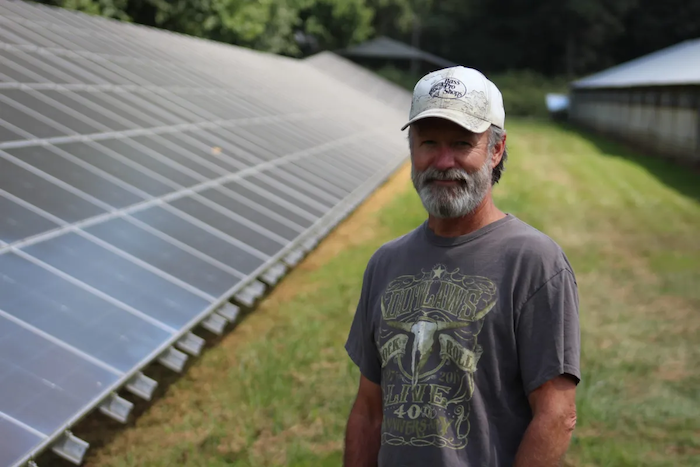
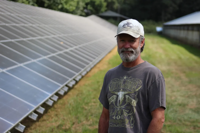

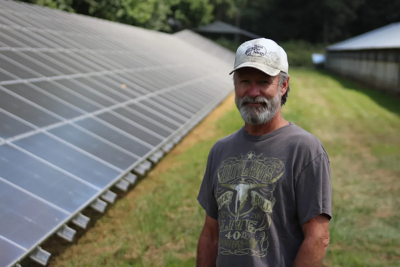








(0) comments
Welcome to the discussion.
Log In
Keep it Clean. Please avoid obscene, vulgar, lewd, racist or sexually-oriented language.
PLEASE TURN OFF YOUR CAPS LOCK.
Don't Threaten. Threats of harming another person will not be tolerated.
Be Truthful. Don't knowingly lie about anyone or anything.
Be Nice. No racism, sexism or any sort of -ism that is degrading to another person.
Be Proactive. Use the 'Report' link on each comment to let us know of abusive posts.
Share with Us. We'd love to hear eyewitness accounts, the history behind an article.